Jintian Zhang
Can We Predict Before Executing Machine Learning Agents?
Jan 09, 2026Abstract:Autonomous machine learning agents have revolutionized scientific discovery, yet they remain constrained by a Generate-Execute-Feedback paradigm. Previous approaches suffer from a severe Execution Bottleneck, as hypothesis evaluation relies strictly on expensive physical execution. To bypass these physical constraints, we internalize execution priors to substitute costly runtime checks with instantaneous predictive reasoning, drawing inspiration from World Models. In this work, we formalize the task of Data-centric Solution Preference and construct a comprehensive corpus of 18,438 pairwise comparisons. We demonstrate that LLMs exhibit significant predictive capabilities when primed with a Verified Data Analysis Report, achieving 61.5% accuracy and robust confidence calibration. Finally, we instantiate this framework in FOREAGENT, an agent that employs a Predict-then-Verify loop, achieving a 6x acceleration in convergence while surpassing execution-based baselines by +6%. Our code and dataset will be publicly available soon at https://github.com/zjunlp/predict-before-execute.
Why Do Open-Source LLMs Struggle with Data Analysis? A Systematic Empirical Study
Jun 24, 2025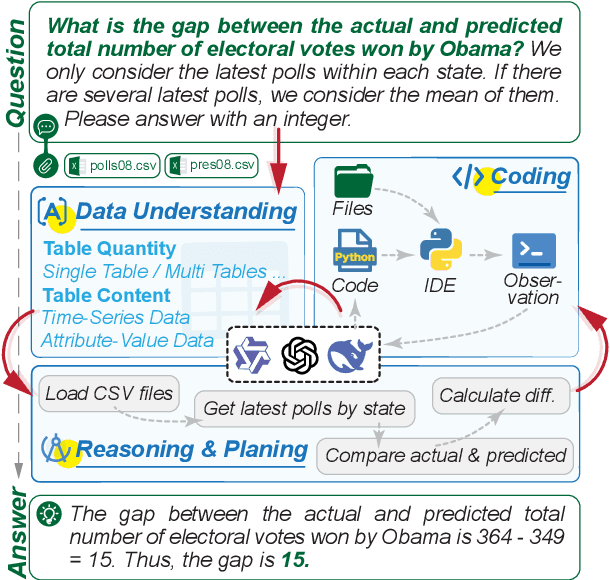
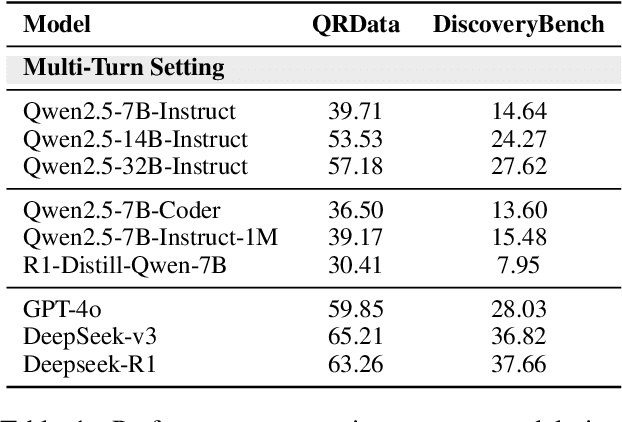

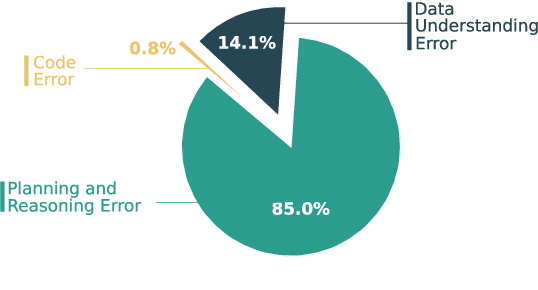
Abstract:Large Language Models (LLMs) hold promise in automating data analysis tasks, yet open-source models face significant limitations in these kinds of reasoning-intensive scenarios. In this work, we investigate strategies to enhance the data analysis capabilities of open-source LLMs. By curating a seed dataset of diverse, realistic scenarios, we evaluate models across three dimensions: data understanding, code generation, and strategic planning. Our analysis reveals three key findings: (1) Strategic planning quality serves as the primary determinant of model performance; (2) Interaction design and task complexity significantly influence reasoning capabilities; (3) Data quality demonstrates a greater impact than diversity in achieving optimal performance. We leverage these insights to develop a data synthesis methodology, demonstrating significant improvements in open-source LLMs' analytical reasoning capabilities.
AutoMind: Adaptive Knowledgeable Agent for Automated Data Science
Jun 12, 2025Abstract:Large Language Model (LLM) agents have shown great potential in addressing real-world data science problems. LLM-driven data science agents promise to automate the entire machine learning pipeline, yet their real-world effectiveness remains limited. Existing frameworks depend on rigid, pre-defined workflows and inflexible coding strategies; consequently, they excel only on relatively simple, classical problems and fail to capture the empirical expertise that human practitioners bring to complex, innovative tasks. In this work, we introduce AutoMind, an adaptive, knowledgeable LLM-agent framework that overcomes these deficiencies through three key advances: (1) a curated expert knowledge base that grounds the agent in domain expert knowledge, (2) an agentic knowledgeable tree search algorithm that strategically explores possible solutions, and (3) a self-adaptive coding strategy that dynamically tailors code generation to task complexity. Evaluations on two automated data science benchmarks demonstrate that AutoMind delivers superior performance versus state-of-the-art baselines. Additional analyses confirm favorable effectiveness, efficiency, and qualitative solution quality, highlighting AutoMind as an efficient and robust step toward fully automated data science.
Knowledge Augmented Complex Problem Solving with Large Language Models: A Survey
May 06, 2025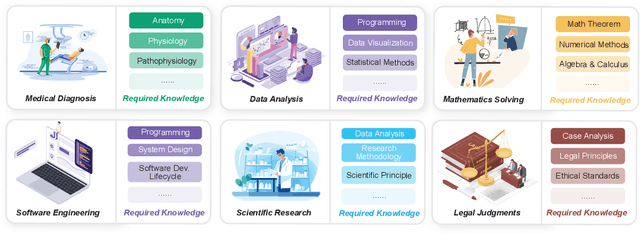
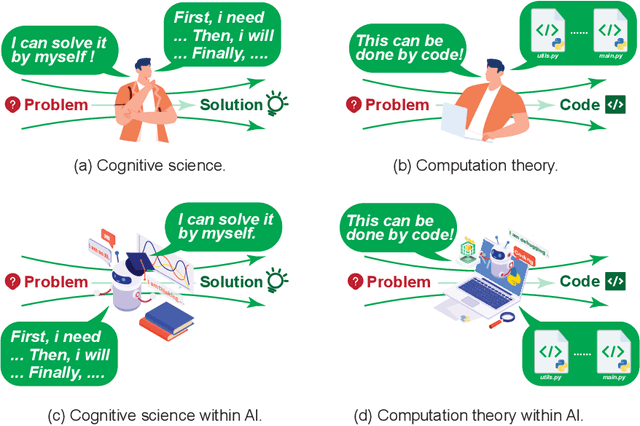
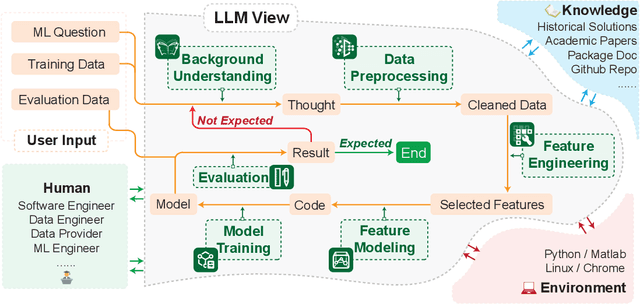

Abstract:Problem-solving has been a fundamental driver of human progress in numerous domains. With advancements in artificial intelligence, Large Language Models (LLMs) have emerged as powerful tools capable of tackling complex problems across diverse domains. Unlike traditional computational systems, LLMs combine raw computational power with an approximation of human reasoning, allowing them to generate solutions, make inferences, and even leverage external computational tools. However, applying LLMs to real-world problem-solving presents significant challenges, including multi-step reasoning, domain knowledge integration, and result verification. This survey explores the capabilities and limitations of LLMs in complex problem-solving, examining techniques including Chain-of-Thought (CoT) reasoning, knowledge augmentation, and various LLM-based and tool-based verification techniques. Additionally, we highlight domain-specific challenges in various domains, such as software engineering, mathematical reasoning and proving, data analysis and modeling, and scientific research. The paper further discusses the fundamental limitations of the current LLM solutions and the future directions of LLM-based complex problems solving from the perspective of multi-step reasoning, domain knowledge integration and result verification.
LightThinker: Thinking Step-by-Step Compression
Feb 21, 2025Abstract:Large language models (LLMs) have shown remarkable performance in complex reasoning tasks, but their efficiency is hindered by the substantial memory and computational costs associated with generating lengthy tokens. In this paper, we propose LightThinker, a novel method that enables LLMs to dynamically compress intermediate thoughts during reasoning. Inspired by human cognitive processes, LightThinker compresses verbose thought steps into compact representations and discards the original reasoning chains, thereby significantly reducing the number of tokens stored in the context window. This is achieved by training the model on when and how to perform compression through data construction, mapping hidden states to condensed gist tokens, and creating specialized attention masks. Additionally, we introduce the Dependency (Dep) metric to quantify the degree of compression by measuring the reliance on historical tokens during generation. Extensive experiments on four datasets and two models show that LightThinker reduces peak memory usage and inference time, while maintaining competitive accuracy. Our work provides a new direction for improving the efficiency of LLMs in complex reasoning tasks without sacrificing performance. Code will be released at https://github.com/zjunlp/LightThinker.
OneEdit: A Neural-Symbolic Collaboratively Knowledge Editing System
Sep 09, 2024



Abstract:Knowledge representation has been a central aim of AI since its inception. Symbolic Knowledge Graphs (KGs) and neural Large Language Models (LLMs) can both represent knowledge. KGs provide highly accurate and explicit knowledge representation, but face scalability issue; while LLMs offer expansive coverage of knowledge, but incur significant training costs and struggle with precise and reliable knowledge manipulation. To this end, we introduce OneEdit, a neural-symbolic prototype system for collaborative knowledge editing using natural language, which facilitates easy-to-use knowledge management with KG and LLM. OneEdit consists of three modules: 1) The Interpreter serves for user interaction with natural language; 2) The Controller manages editing requests from various users, leveraging the KG with rollbacks to handle knowledge conflicts and prevent toxic knowledge attacks; 3) The Editor utilizes the knowledge from the Controller to edit KG and LLM. We conduct experiments on two new datasets with KGs which demonstrate that OneEdit can achieve superior performance.
OneGen: Efficient One-Pass Unified Generation and Retrieval for LLMs
Sep 08, 2024



Abstract:Despite the recent advancements in Large Language Models (LLMs), which have significantly enhanced the generative capabilities for various NLP tasks, LLMs still face limitations in directly handling retrieval tasks. However, many practical applications demand the seamless integration of both retrieval and generation. This paper introduces a novel and efficient One-pass Generation and retrieval framework (OneGen), designed to improve LLMs' performance on tasks that require both generation and retrieval. The proposed framework bridges the traditionally separate training approaches for generation and retrieval by incorporating retrieval tokens generated autoregressively. This enables a single LLM to handle both tasks simultaneously in a unified forward pass. We conduct experiments on two distinct types of composite tasks, RAG and Entity Linking, to validate the pluggability, effectiveness, and efficiency of OneGen in training and inference. Furthermore, our results show that integrating generation and retrieval within the same context preserves the generative capabilities of LLMs while improving retrieval performance. To the best of our knowledge, OneGen is the first to enable LLMs to conduct vector retrieval during the generation.
A Comprehensive Study of Knowledge Editing for Large Language Models
Jan 09, 2024

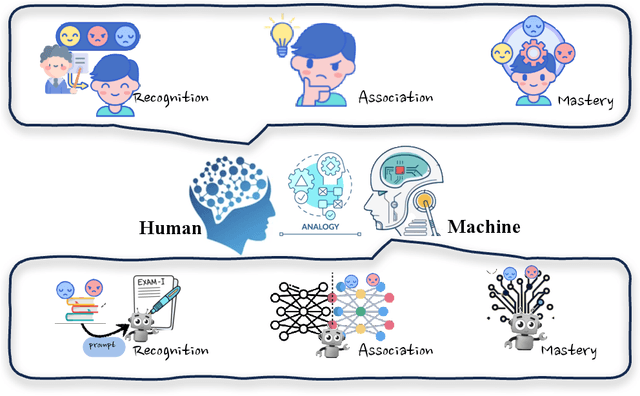

Abstract:Large Language Models (LLMs) have shown extraordinary capabilities in understanding and generating text that closely mirrors human communication. However, a primary limitation lies in the significant computational demands during training, arising from their extensive parameterization. This challenge is further intensified by the dynamic nature of the world, necessitating frequent updates to LLMs to correct outdated information or integrate new knowledge, thereby ensuring their continued relevance. Note that many applications demand continual model adjustments post-training to address deficiencies or undesirable behaviors. There is an increasing interest in efficient, lightweight methods for on-the-fly model modifications. To this end, recent years have seen a burgeoning in the techniques of knowledge editing for LLMs, which aim to efficiently modify LLMs' behaviors within specific domains while preserving overall performance across various inputs. In this paper, we first define the knowledge editing problem and then provide a comprehensive review of cutting-edge approaches. Drawing inspiration from educational and cognitive research theories, we propose a unified categorization criterion that classifies knowledge editing methods into three groups: resorting to external knowledge, merging knowledge into the model, and editing intrinsic knowledge. Furthermore, we introduce a new benchmark, KnowEdit, for a comprehensive empirical evaluation of representative knowledge editing approaches. Additionally, we provide an in-depth analysis of knowledge location, which can give a deeper understanding of the knowledge structures inherent within LLMs. Finally, we discuss several potential applications of knowledge editing, outlining its broad and impactful implications.
Exploring Collaboration Mechanisms for LLM Agents: A Social Psychology View
Oct 03, 2023



Abstract:As Natural Language Processing (NLP) systems are increasingly employed in intricate social environments, a pressing query emerges: Can these NLP systems mirror human-esque collaborative intelligence, in a multi-agent society consisting of multiple large language models (LLMs)? This paper probes the collaboration mechanisms among contemporary NLP systems by melding practical experiments with theoretical insights. We fabricate four unique `societies' comprised of LLM agents, where each agent is characterized by a specific `trait' (easy-going or overconfident) and engages in collaboration with a distinct `thinking pattern' (debate or reflection). Evaluating these multi-agent societies on three benchmark datasets, we discern that LLM agents navigate tasks by leveraging diverse social behaviors, from active debates to introspective reflections. Notably, certain collaborative strategies only optimize efficiency (using fewer API tokens), but also outshine previous top-tier approaches. Moreover, our results further illustrate that LLM agents manifest human-like social behaviors, such as conformity or majority rule, mirroring foundational Social Psychology theories. In conclusion, we integrate insights from Social Psychology to contextualize the collaboration of LLM agents, inspiring further investigations into the collaboration mechanism for LLMs. We commit to sharing our code and datasets (already submitted in supplementary materials), hoping to catalyze further research in this promising avenue (All code and data are available at \url{https://github.com/zjunlp/MachineSoM}.).
Agents: An Open-source Framework for Autonomous Language Agents
Sep 14, 2023Abstract:Recent advances on large language models (LLMs) enable researchers and developers to build autonomous language agents that can automatically solve various tasks and interact with environments, humans, and other agents using natural language interfaces. We consider language agents as a promising direction towards artificial general intelligence and release Agents, an open-source library with the goal of opening up these advances to a wider non-specialist audience. Agents is carefully engineered to support important features including planning, memory, tool usage, multi-agent communication, and fine-grained symbolic control. Agents is user-friendly as it enables non-specialists to build, customize, test, tune, and deploy state-of-the-art autonomous language agents without much coding. The library is also research-friendly as its modularized design makes it easily extensible for researchers. Agents is available at https://github.com/aiwaves-cn/agents.
 Add to Chrome
Add to Chrome Add to Firefox
Add to Firefox Add to Edge
Add to Edge